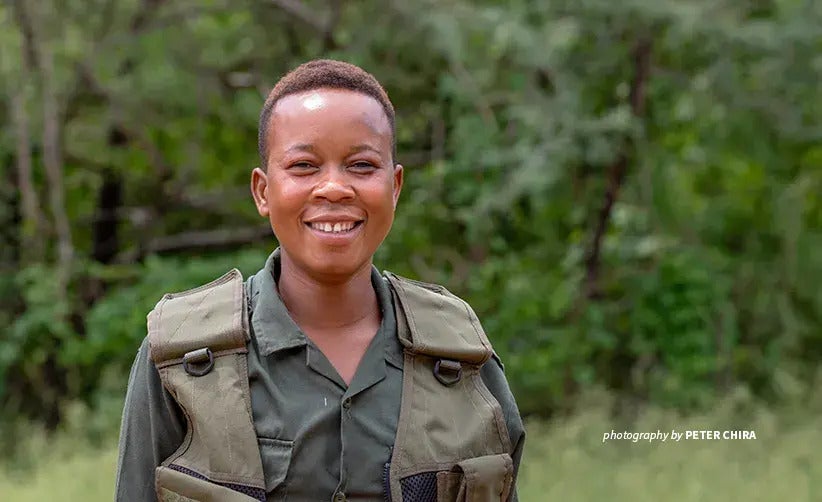“A lion killed my dad, but I followed him into a career in conservation anyway”
Daughter follows her father and becomes anti-poaching ranger in Zimbabwe

By Farayi Machamire for Zim Morning Post
Twelve years ago, a dedicated anti-poaching ranger was viciously mauled to death after being ambushed by a lion in a safari park in northern Zimbabwe. Eight years later, his daughter rose above those emotional wounds to take up the journey her father began.
Wildlife scout Edith John is now one of 15 female scouts in a male dominated industry, helping the Mbire community in central Zimbabwe deal with human-wildlife conflict incidents safely.
Edith, 32, says her dedication to wildlife protection is a product of her father’s love for conservation.
“I am a product of my father’s love for wildlife and his love for people living with wildlife. My father was a game scout who bravely protected wildlife from poachers,” she says.
“He also worked very hard to protect farmers from wild animals. He got killed by a lion in 2010 during his trip working on human wildlife conflict. His death did not kill my spirit for wildlife protection.”
Official data shows that just over 350 people have been killed in human wildlife conflict since 2014.
At least 90 people were killed in the last 15 months. Elephants, lions and crocodiles account for most of the human wildlife conflict encounters.
Just over 1,150 animals, caught up in conflicts with humans, have been eliminated by rangers in the last eight years countrywide, Zimbabwe Parks and Wildlife Authority officials say.
Wildlife experts say it is extremely unusual for lions to attack humans but are quick to remind that “wildlife does not not play by any rules.”
The tragedy, however, did not deter Edith.
In 2018, she began a journey with the African Wildlife Foundation (AWF) to conserve wildlife, after she had been nominated among the first female recruits to help spearhead community conservation in the village of Angwa in Mbire District.
At first, she faced resistance from her community as the work of a community scout required one to take up arms and actively defend the community from wild animals and people, a job that is not the traditional domain of women in rural Zimbabwe.
They, however, warmed up to the idea later, she says. Edith’s wildlife management training, supported by AWF, provided modules on human rights and rights-based conservation.
“We started as five female game scouts in Mbire and now there are 15 female game scouts out of over 100 scouts in the district,” says the mother of two.
Among the roles of the community wildlife scouts is to ease human-wildlife tensions in communal areas and conduct anti-operations to reduce illegal wildlife trade.
They also respond to incursions by large mammals like elephants and mitigate livestock predation by lions and hyenas, while educating residents on the benefits of conservation.
AWF Country Director, Olivia Mufute, who spearheaded the recruitment exercise, said the international conservation NGO was deliberate in recruiting women community scouts in Mbire.
“During the process, I was pleased to hear that there were women in this area who were interested; sadly, all they lacked were the opportunities,” she told the AWF website.
“Personally, championing the recruitment of the first women community scouts is extremely meaningful. When I joined Zimbabwe Parks and Wildlife Management Authority (or Zimparks) as a young, entry-level ecologist, to a very large extent my colleagues were male,” she continued.
“Moreover, the authority had not appointed any women in leadership positions. It could take up to 10-15 years for a woman to be promoted in her job, whether it was for a more senior role or as an area manager. By the time I left Zimparks, I had risen the ranks to the position of Chief
Ecologist overseeing both terrestrial and aquatic ecology portfolios in Zimbabwe’s protected areas.”
For Edith, growing up her desire was to become a nurse. That changed when tragedy struck in 2010.
“I knew then that I wanted to do my part to make it safer for people to coexist with wildlife,” she says.
Now she finds solace and purpose in spending her days keeping the peace between human beings and wildlife.
This article is reproduced here as part of the African Conservation Journalism Programme, funded in Angola, Botswana, Mozambique, and Zimbabwe by USAID’s VukaNow: Activity. Implemented by the international conservation organisation Space for Giants, it aims to expand the reach of conservation and environmental journalism in Africa, and bring more African voices into the international conservation debate.
Read the original story here.
Join our commenting forum
Join thought-provoking conversations, follow other Independent readers and see their replies
Comments
Bookmark popover
Removed from bookmarks